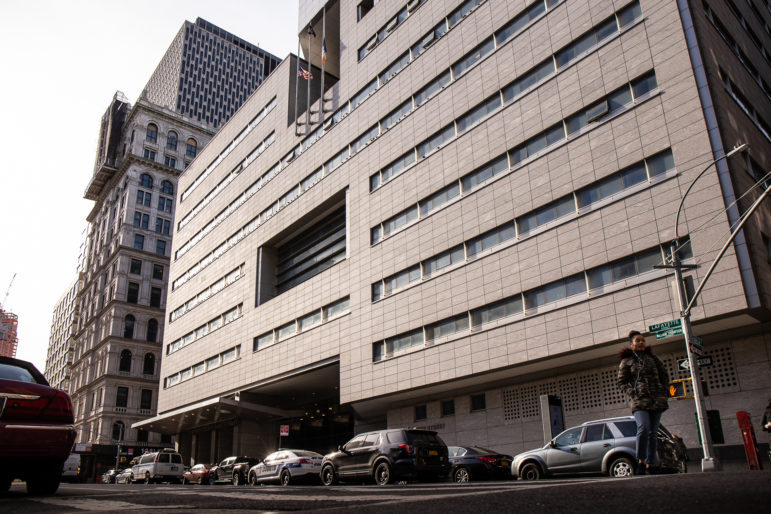“These rates of over-investigation are state-sanctioned family policing. Even where investigations are warranted and allegations are substantiated, the investigative process is often coercive and traumatic, indelibly harming the children the investigations intend to protect.”
Adi Talwar
New York County Family Court at 60 Lafayette Street in Manhattan.
CityViews are readers’ opinions, not those of City Limits. Add your voice today!
Imagine you are 10 years old; a child abuse investigator bangs on your door at 3 a.m., demanding to search your home and threatening to take you from your parents. Imagine the investigator did this without a warrant—and that when your parent felt they had no choice but to let them in, they strip-searched you. Think this can’t happen here? This nightmare is reality for nearly 100,000, mostly Black and brown children, in New York City annually.
Earlier this month, the NYC Family Policy Project released a bombshell report demonstrating, in no uncertain terms, that New York investigates far too many children and families for suspected abuse or neglect. The report comes just days after the filing of a class action lawsuit, Gould, by parents suing New York City for violating their Fourth Amendment Rights in coercively and systematically conducting warrantless searches of their homes. As attorneys for children, we applaud these efforts to shine light on a pernicious problem.
Each year, nearly 100,000 children are subject to investigation by the Administration for Children’s Services (“ACS”). ACS only substantiates—finds that it is more likely than not maltreatment occurred—approximately 23 percent of its investigations a year. This suggests nearly 77,000 children endure unnecessary investigation by ACS annually. These rates of over-investigation are state-sanctioned family policing. Even where investigations are warranted and allegations are substantiated, the investigative process is often coercive and traumatic, indelibly harming the children the investigations intend to protect.
ACS’ primary mandate is to protect NYC’s children. Investigating allegations of abuse and neglect is necessary and—if done properly—critical to carrying out that mandate. Unfortunately, the aggressive and coercive tactics ACS employs to investigate, and the volume of children and families that it investigates, have created an apparatus that harms more children than it protects.
During an investigation, which lasts 60 days, ACS workers regularly enter and search through children’s homes in the middle of the night, threaten family separation, show up unannounced in their schools, and interview countless individuals connected to their lives. Regardless of the allegations or age of the child, ACS frequently interrogates and strip searches the child at least once, and often multiple times.
In a study conducted by ACS and then shelved, an ACS investigator likened an investigation to “being stopped and frisked for 60 days” and “[c]aseworkers said they felt pressured to push their way into people’s homes without advising parents of their rights.” Needless to say, such tactics are harmful for children, but there is also a plethora of social science research that establishes these harms. Even the ACS Commissioner, Jess Dannhauser, acknowledged that “investigations are often disruptive, stressful and can be traumatic.”
The coercive, traumatic nature of ACS investigations is particularly disturbing when accounting for race. Nearly one out of every two Black children in New York City has been, or will be, the subject of an ACS investigation by the time they turn 18. These numbers alone are an urgent cry for change.
Like their parents, children have a Fourth Amendment right to be protected from unreasonable searches. Nevertheless, ACS seeks warrants in a mere 0.4 percent of investigations. It is unfathomable that emergency circumstances or meaningful parental consent—exceptions to the warrant requirement— exist in 99.6 percent of investigations. The numbers paint a clear picture of consent routinely obtained through coercion and an abuse of emergency powers.
Action by New York is long overdue. The following six recommendations are necessary first steps. First, the State Central Register (“SCR”), which receives all allegations of abuse and neglect in New York, must strengthen the screen-out process—disregarding allegations that do not meet the agency’s own requirements for investigation.
Second, New York must pass the Anti-Harassment in Reporting Bill which requires those who report abuse or neglect to identify themselves to deter false reporting. Third, New York must pass the Family Miranda Bill, which requires child welfare investigators to advise parents of their rights at initial contact, absent an emergency. Fourth, child welfare investigators must seek a warrant prior to investigating a family’s home whenever feasible.
Fifth, New York must move toward the elimination of mandated reporting, because most professionals now mandated to report would still report suspected abuse or neglect, and legal penalties incentivize over reporting. Finally, child welfare investigators must minimize the use of harmful, traumatic investigative tactics such as middle of the night home visits and strip-searching children.
Child welfare investigations in New York City are currently hurting more children than they are helping. We hope that the NYC Family Policy Project’s report and the Gould litigation, compel New York to re-examine the family regulation system, overhaul the investigative apparatus, and put the wellbeing of children and families first.
Dawne Mitchell is chief attorney of the Juvenile Rights Practice at The Legal Aid Society. Melissa Friedman is director of child welfare training with the Juvenile Rights Practice at The Legal Aid Society. Daniella Rohr is a staff attorney with the Immigration Law Unit’s Youth Project at The Legal Aid Society


Leave a Reply